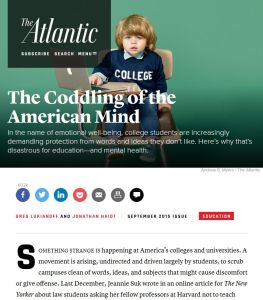
Greg Lukianoff and Jonathan Haidt
The Coddling of the American Mind
The Atlantic, 2015
What's inside?
“Microaggressions” and “trigger warnings” are symptoms of a new era of anxiety on college campuses.
Recommendation
Traditionally heralded as a place to think, grow and learn, academia today increasingly faces accusations of “microaggresions.” And professors find themselves compelled to give students “trigger warnings,” for fear that certain topics will bring up negative feelings. Social psychologist Jonathan Haidt and CEO Greg Lukianoff delve into the growing phenomenon wherein student politics is clamping down on free speech and robbing young people of the opportunity to learn how to cope with opinions different from their own. getAbstract recommends this intriguing analysis to all university staff and students, as well as parents about to send their children off to college.
Take-Aways
- The term “microaggressions” – minor actions or words that seem innocent at first, but which students may interpret as a “kind of violence” – is quickly becoming part of standard university vernacular in the United States.
- Professors at some schools now provide students with “trigger warnings” – alerts that certain content could “cause a strong emotional response.”
- Not only does such protectiveness misalign with the challenges students will face when they enter the working world, but it also teaches them to think in ways closely tied to anxiety and depression.
- The “most-basic tenets of psychology” advise against helping someone with anxiety to avoid what they fear.
- It is the duty of colleges to equip young people to live in a society filled with sentiments they can’t control.
Summary
The term “microaggressions” – minor actions or words that seem innocent at first, but which students may interpret as a “kind of violence” – is quickly becoming part of standard university vernacular in the United States. Comments such as asking an Asian person, “Where were you born?” qualify as microagressions, because they imply that someone “is not a real American.” Some professors provide students with “trigger warnings” – alerts that certain content could “cause a strong emotional response.” Harvard law students even asked professors not to teach rape law because it might upset someone.
“What are we doing to our students if we encourage them to develop extra-thin skin just before they leave the cocoon of adult protection?”
How does this new form of “protectiveness” affect students? Not only does protectiveness misalign with the challenges students will face when they enter the working world, but it also teaches them to think in ways closely tied to anxiety and depression. In 2014, an American College Health Association survey showed that 54% of college students had “felt overwhelming anxiety” in the past year. If professors are trying to protect youth, they are misguided. The “most-basic tenets of psychology” advise against helping someone with anxiety to avoid what they fear. For example, if a man is terrified of elevators, he shouldn’t take the stairs. Instead, he should undergo “exposure therapy,” gradually reintroducing elevators to his life. This way, his brain will rewire to see them as safe. Classroom settings are one of the safest places students can expose themselves to fears. Once they enter post-university life, the world will be far less accommodating.
“According to the most basic tenets of psychology, helping people with anxiety disorders avoid the things they fear is misguided.”
Protecting students from words, ideas and people that might cause emotional discomfort harms the students themselves, their future employers and colleagues, and American democracy. It is the duty of colleges to equip young people to live in a society filled with sentiments they can’t control. Colleges should promote free speech and talk openly about tolerance. The US government must protect universities, legally, from prosecution for saying things students may not like. Colleges should reject the concept of trigger warnings and discourage professors from using them. Finally, universities should encourage students to expose themselves to ideas with which they may not agree, and teach them that such exposure isn’t always a catastrophe.
About the Authors
Greg Lukianoff is CEO of Foundation for Individual Rights in Education. Social psychologist Jonathan Haidt, PhD, is an ethical leadership professor at NYU-Stern School of Business.
This document is restricted to personal use only.
My Highlights
Did you like this summary?
Read the articleThis summary has been shared with you by getAbstract.
We find, rate and summarize relevant knowledge to help people make better decisions in business and in their private lives.
Already a customer? Log in here.






















Comment on this summary